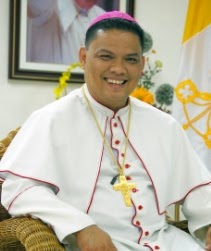 |
| Archbishop Soc Villegas (Photo: Roy Lagarde) |
PRESIDENT of Catholic Bishops Conference of the
Philippines and Lingayen Dagupan Archbishop Socrates Villegas called on fellow
bishops to be “contemplative shepherds” who seek only the good for their flock.
He said it is only through a life “soaked” in prayer and contemplation
that bishops would be able to teach their flock in full freedom, “freedom from
the fascination of political or social gain, freedom from the insane and unreal
attraction of popularity in the world.”
“To be contemplative bishops is to become truthfully honest, cheerfully
loving and passionately zealous teachers of the flock, bishops serving the Lord
in total freedom detached from vainglory,” Villegas said in a speech at the
opening of the bishops’ 108th plenary assembly at Pius XII Center,
Jan. 25.
The CBCP president also stressed the important role of the laity to pray
for their bishops so that they will transformed into contemplative pastors.
He also asked Religious sisters and seminarians, as well as lay devotees
to pray for the bishops as they meet for the plenary assembly.
Villegas had a small chapel put up beside the plenary hall so prayer
warriors can take turns in the adoration of the Blessed Sacrament for the whole
duration of the CBCP plenary assembly, which will end on Jan. 27.
“They are praying for us their pastors. The flock is praying for their
shepherds. The lambs and sheep are praying for us their pastors,” Villegas told
fellow bishops.
“This is
the Church of the new evangelization. Let us allow our flock to transform us
their pastors into contemplative shepherds of the people,” he said.
Inclusive celebration
Villegas said the celebration of the Year of the laity should not be an
exclusive affair for those who are supportive of the Church.
But it
should include “the critical and distant ones more importantly those who
disagreed with us on the RH law, those who hurl accusations at us fairly or
unfairly. They are children of God too, our brothers and sisters, members of
our flock also,” said Villegas.
“We can
do this if we are soaked in prayer as contemplative shepherds of the people
freed from fear and rejection, carrying the mark of Christ scourged, crucified
yet risen,” he said.
Villegas
pointed out that it is also important to discern that their movement towards
contemplation is not merely an escape from pastoral realities.
He said
it is important to always look for the fruit of prayer, as true prayer will
always lead to “greater charity for the poor” and an “increase of love”.
“If
contemplation does not lead to action for justice and charity, it might have
really become the “shabu” of the bishops, an addictive flight from reality,”
the CBCP president said.
A life
that has truly encountered Jesus in prayer, said Villegas, must guide the
bishops’ response to the poor in today’s society.
“The poor
are not just curious ciphers on a statistical report. The poor are not just the
unlettered, the unwashed, the uninitiated, the uneducated, the unhealthy, the
naked, the exploited, the trafficked, and the infirm gazing into our eyes for
human recognition,” he said.
Reach out sincerely to others
He
encouraged fellow bishops to heed the advice of Pope Francis in planning church
programs and projects, especially in this year of the Laity, “to resist the
temptation” of talking and acting “like spiritual masters and pastoral experts
who give instructions from on high.”
He said
it is important to “stay focused on the Lord and reach out sincerely to the
distant poor and the wayward children of God.”
“We
cannot allow the Year of the Laity to create more circles of elite and
closed-in lay groups sometimes called mandated organizations,” Villegas said.
“We need
to reach out to those who are angry at us bishops, those we have disillusioned
and those we have misled or confused by our excessive misplaced prudence or
unbecoming lifestyle,” he said.
‘The best of times, the worst of
times’
Noting
the many calamities and scandals that happened in the country in the past six
months since the last plenary assembly, Villegas couldn’t help himself but
quote Charles Dickens by saying it has been “the best of times” and “the worst
of times.”
“We were
visited by the strongest typhoon in the world two months ago but the Lord has
blessed the Church in Mindanao with its first Cardinal, Cardinal Orly Quevedo,
OMI,” Villegas said.
“Thousands
died from the storm surge in Leyte but it also brought us an admirable surge of
charity worldwide,” he added.
But he also
said it is important to look with the eyes of a contemplative the recent
devastation caused by Typhoon Yolanda and the massive destruction wrought by
the earthquake.
“We must
look at these events with the eyes of the Lord, feel with the heart of the Lord
and act with the hands and feet of the Lord. Our best contribution to the
rehabilitation in Samar or Leyte, Bohol or Zamboanga is Christ,” Villegas said.
“We send
help because of Christ, in Christ and through Christ,” Villegas told fellow
bishops. “Our task is not just to build new homes that can be washed away again
by the next storm surges. Our mission is not just to send food for the hungry
and give water to the thirsty.”
“The
Christ that is in me reaches out to the Christ that is suffering. It is Christ
reaching out to Christ,” he said. “We will miss this point if we are not
contemplative bishops. We can even reduce NASSA and the CBCP into just another
philanthropic institution and we are not. We are Christ’s,” Villegas said.




.jpg)


